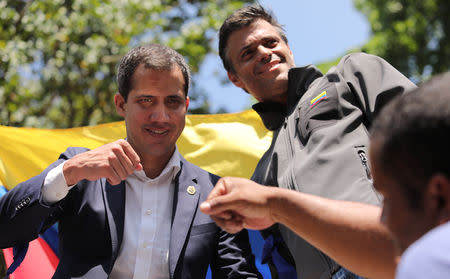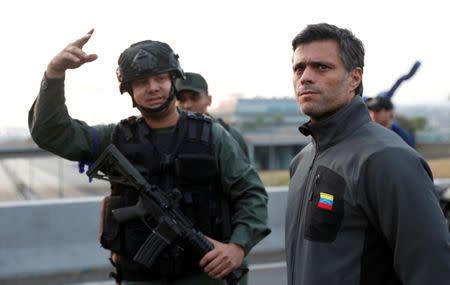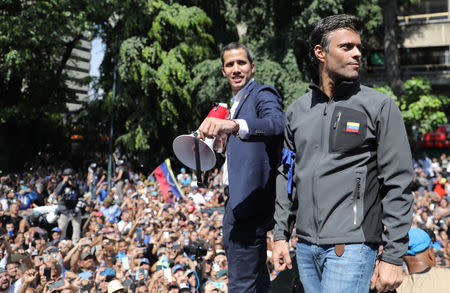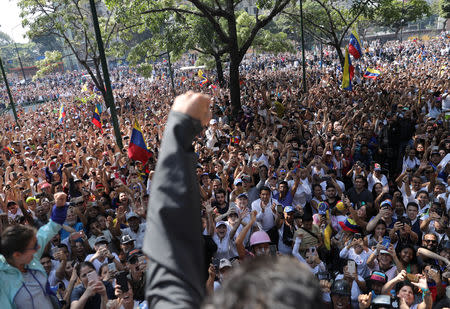Return of firebrand opposition leader Lopez energizes Venezuelan protests
By Angus Berwick and Vivian Sequera
CARACAS (Reuters) - When Felix Garcia woke up on Tuesday he was fired up by surprising news - Venezuelan opposition politician Leopoldo Lopez, under house arrest for the past two years, had appeared in public.
Lopez's appearance alongside National Assembly leader Juan Guaido was enough to convince the 30-year-old computer programmer to join tens of thousands of Venezuelans protesting against President Nicolas Maduro on Tuesday.
"Our spirits have been low, but when we saw Leopoldo Lopez out on Caracas' streets, it was a signal to again return to the fight," Garcia said, a gas mask hanging from his neck and chunks of concrete stuffed in the pockets of his hoodie.
Lopez, 48, oversaw Guaido's rise from student leader and remains a key figure in their Popular Will party.
In moments still memorialized in images on opposition banners and t-shirts, he was arrested in 2014 after leading anti-government protests and pictured pumping his fist and stepping into a military vehicle with a Venezuelan flag in one hand and a white flower in the other.
A dozen protesters told Reuters his return had given them new confidence in the plan proposed by the 35-year-old Guaido, who assumed an interim presidency in January and denounces Maduro as an usurper. But they also said the government could use his return to crack down.
While Guaido has replaced him as the most prominent figure in the opposition, Lopez still commands the protesters' respect.
"When we saw him with Guaido, it filled you with hope, and you left with more strength than ever to end this as soon as possible," said Eduardo, a 27-year-old demonstrator who declined to give his surname.
The government placed Lopez under house arrest in 2017, and since then he had not set foot outside his house in Caracas' Chacao district, guarded by agents from the state intelligence service.
On Tuesday, Lopez appeared on an overpass by the La Carlota air base, joined by Guaido and several dozen soldiers who had disavowed Maduro. Lopez told a Reuters reporter there that intelligence agents had allowed him to leave his house.
"Good morning Venezuela," Lopez told reporters on the overpass. "To all my brothers in the armed forces, now is the moment."
After attending a series of rallies across Caracas, Lopez and his family first entered Chile's diplomatic residence, then moved to the Spanish embassy, the Chilean foreign minister said.
Guaido and Lopez's call on Tuesday for a military uprising marks the opposition's boldest effort yet to persuade the armed forces to rise up against Maduro. But there were no concrete signs of defection from the armed forces leadership, and Maduro said he had the military's loyalty.
The government has so far not commented on whether it would seek to re-arrest Lopez for breaking his house arrest.
Lopez was convicted of having incited protests against Maduro and sentenced to 14 years in prison. Diosdado Cabello, head of a pro-government legislative superbody called the constituent assembly, denounced Lopez on Twitter on Tuesday as a "fascist murderer."
Opposition leaders and critics around the world have slammed the case against him as a sham and described the trial as a mockery of justice.
"He's a figure that we have always followed," Eduardo said on Tuesday, retreating from one protest just south of Caracas' Altamira plaza where soldiers were firing tear gas at the crowd.
As he spoke, medics sped past on motorbikes transporting injured demonstrators.
(Additional reporting by Mayela Armas and Luc Cohen; Editing by Sonya Hepinstall)






